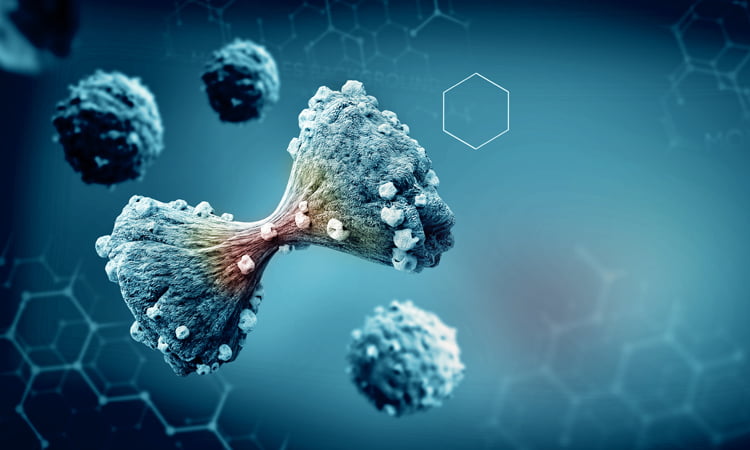Antibodies allow for a targeted approach to cancer therapy
Posted: 26 March 2020 | Nikki Withers (Drug Target Review) | No comments yet
Cancer can be an immovable beast, tenacious in its numerous mechanisms to thrive and grow. However, the healthcare industry has an ever-expanding arsenal of therapies designed to thwart it, with variable levels of success. Nikki Withers speaks to Dr Jill O’Donnell-Tormey, CEO and Director of Scientific Affairs at the Cancer Research Institute (CRI), who explains why antibodies have the edge over other targeted drugs.


THERE ARE many types of cancer treatment, and the treatment that a patient receives will depend on the type of cancer and how advanced it is. Cancer cells have differences in their genes that distinguish them from normal cells through uncontrolled growth or the ability to divide very quickly. However, there are many different forms of cancer and not all cancer cells are the same. For example, colon cancer and breast cancer cells exhibit different gene changes; even among different people with the same type of cancer, the cancer cells can have different gene changes, making one person’s specific type of cancer different from another’s.
Researchers have also learned that the environment in which the cancer originates, grows and develops is not always the same. For example, some cancers have particular types of proteins or enzymes that send messages to tell the cancer cell to grow and copy itself. Understanding these details has led to the development of drugs that can target these proteins or enzymes and block the messages being sent. Targeted therapy is a form of cancer treatment that uses drugs designed to target cancer cells, without affecting normal cells and are currently the focus of much anticancer drug development.
The action of targeted drugs can work to:
Drug Target Review has just announced the launch of its NEW and EXCLUSIVE report examining the evolution of AI and informatics in drug discovery and development.
In this 63 page in-depth report, experts and researchers explore the key benefits of AI and informatics processes, reveal where the challenges lie for the implementation of AI and how they see the use of these technologies streamlining workflows in the future.
Also featured are exclusive interviews with leading scientists from AstraZeneca, Auransa, PolarisQB and Chalmers University of Technology.
- block or turn off chemical signals that instruct the cancer cell to grow and divide
- change proteins within the cancer cells so the cells die
- stop making new blood vessels to feed the cancer cells
- trigger the immune system to kill the cancer cells
- carry toxins to the cancer cells to kill them, while avoiding normal cells.
Many different targeted therapies have been approved for use in cancer treatment. These include hormone therapies, signal transduction inhibitors, gene expression modulators, apoptosis inducers, angiogenesis inhibitors, immunotherapies and toxin delivery molecules.
An antibody-based approach
Some mAbs influence the immune system so that it is better positioned to kill cancer cells”
Monoclonal antibodies (mAbs), also known as therapeutic antibodies, are proteins produced in the lab that are designed to attach to specific targets on cancer cells. Each mAb recognises one particular protein, so different mAbs have to be made to recognise specific targets on cancer. Some mAbs mark the cancer cell so that they will be identified and destroyed by the immune system while others prevent cancer cells from growing or dividing or cause them to self-destruct. Others carry toxins, drugs, or radiation to cancer cells.
- Blocking signals telling cancer cells to divide
Cancer cells often express large quantities of growth factor receptors. These are expressed on the cell surface and send signals to help the cell survive and divide. Some mAbs will bind to growth factor receptors, blocking the signal or the receptor itself.
- Conjugated mAbs
Some mAbs have drugs or radioactive substances attached to them, enabling them to deliver the drug or radioactive substance directly to a specific cell. These are called conjugated mAbs.
- Influencing the immune system
Some mAbs influence the immune system so that it is better positioned to kill cancer cells. Examples of these include antibodies that block checkpoints, which releases the brakes on the immune system. In another immune-based process called antibody-dependent cell-mediated cytotoxicity, or ADCC, mAbs attach to the surface of a cancer cell, marking them for destruction by the immune system.
The importance of the immune system
Jill O’Donnell-Tormey, PhD, CEO and Director of Scientific Affairs at the Cancer Research Institute (CRI), explained that the immune system is an amazing tool in cancer therapy. “Our immune system has evolved to distinguish self from non-self and reacts to all kinds of assaults and insults that the body may never have been exposed to, amounting to a very specific targeted response,” she explained. “It offers many opportunities for treatment.”


Comparing the potential of mAbs to other forms of targeted therapies, O’Donnell-Tormey said: “When you think about other targeted therapies you usually think about small molecules, which interact with a specific pathway. These tend to work well initially, but after time become less effective. When you are working with antibodies, you are interacting with the immune system in totality, and the immune system is very adaptive. This approach means you are not just affecting a single pathway, you are calling into play the fuller repertoire of the immune system. These mAbs may therefore be able to deliver a more durable response.”
A move to bispecifics
More recently, researchers have been looking to bispecific antibodies for cancer therapies. Bispecific antibodies simultaneously target two different antigens. In immunotherapy, the primary use of bispecifics has been to redirect cytotoxic immune cells for enhanced killing of tumour cells. One bispecific antibody has been approved in the US for use in cancer and many others are under study. These agents typically bind to an antigen on a tumour and to a target on the surface of a T cell. This tethering of tumour to effector immune cell increases the proximity of the two cells while simultaneously triggering T-cell activation. However, O’Donnell-Tormey pointed out that it can be challenging if the antigen targeted on the tumour cell is expressed on normal cells as well. “If the antigen is shared, immune cells can target both normal cells and cancer cells leading to adverse events. In order to make these antibodies more specific to cancer cells, research is currently under way to engineer antibodies that recognise two antigens on a cancer cell and a marker on T cells. This strategy potentially would limit the attack on normal cells. It is a kind of security precaution akin to requiring two keys to launch a missile instead of just one.”
In immunotherapy, the primary use of bispecifics has been to redirect cytotoxic immune cells for enhanced killing of tumour cells”
Other ongoing work involves combining checkpoint-blocking antibodies with other agents that would affect different pathways. “Hopefully, a synergistic approach would have a better response,” O’Donnell-Tormey said. “We have ongoing trials in prostate and pancreatic cancer, and soon ovarian cancer, which are looking at these antibodies in combination with other agents. Sometimes this will be with chemotherapy and sometimes other immunotherapies.” O’Donnell-Tormey concluded that CRI has yet to include bispecific or cellular therapies in their clinical programme, but that they are in discussions to do so.


Related topics
Antibodies, Antibody Discovery, cytotoxicity, Immunology, Monoclonal Antibody, Oncology, Research & Development, toxicology
Related conditions
Cancer
Related people
Dr Jill O’Donnell-Tormey (Cancer Research Institute)



